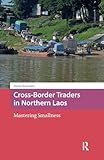Cross-Border Traders in Northern Laos : Mastering Smallness / Tina Harris, Simon Rowedder.
Material type: TextSeries: Asian Borderlands ; 16Publisher: Amsterdam : Amsterdam University Press, [2022]Copyright date: ©2022Description: 1 online resource (262 p.)Content type:
TextSeries: Asian Borderlands ; 16Publisher: Amsterdam : Amsterdam University Press, [2022]Copyright date: ©2022Description: 1 online resource (262 p.)Content type: - 9789463722360
- 9789048554409
- Borderlands -- Economic aspects -- China
- Borderlands -- Economic aspects -- Laos
- Borderlands -- Economic aspects -- Thailand
- Anthropology
- Asian Studies
- East Asia and North East Asia
- Economics and Finance
- South East Asia
- BUSINESS & ECONOMICS / Small Business
- Yunnan, Laos, Thailand, cross-border trade, smallness
- HC443 .R683 2022
- online - DeGruyter
| Item type | Current library | Call number | URL | Status | Notes | Barcode | |
|---|---|---|---|---|---|---|---|
 eBook
eBook
|
Biblioteca "Angelicum" Pont. Univ. S.Tommaso d'Aquino Nuvola online | online - DeGruyter (Browse shelf(Opens below)) | Online access | Not for loan (Accesso limitato) | Accesso per gli utenti autorizzati / Access for authorized users | (dgr)9789048554409 |
Frontmatter -- Table of Contents -- List of Maps and Illustrations -- Acknowledgements -- Notes on Language and Transliteration -- Introduction -- 1 “We Are All Tai Lue” -- 2 “Normal Fruits for Laos, Premium Fruits for China” -- 3 “Thailand: High Quality; China: Low Price” -- 4 “I Didn’t Learn Any Occupation, so I Trade” -- 5 “No Matter What, We’ll Find a Way” -- Conclusion: Large Insights from Smallness -- Bibliography -- Index -- Asian Borderlands
restricted access online access with authorization star
http://purl.org/coar/access_right/c_16ec
Northern Laos has become a prominent spot in large-scale, top-down mappings and studies of neoliberal globalisation and infrastructural development linking Thailand and China, and markets further beyond. Yet in the common narrative, in which Laos appears as a weak victim helplessly exposed to its larger neighbours, attention is seldom paid to local voices. This book fills this gap. Building on long-term multi-sited fieldwork, it accompanies northern Lao cross-border traders closely in their transnational worlds of mobilities, social relations, economic experimentation and aspiration. Cross-Border Traders in Northern Laos: Mastering Smallness demonstrates that these traders’ indispensable but often invisible role in the everyday workings of the China-Laos-Thailand borderland economy relies on their rhetoric and practices of ‘smallness’—of framing their transnational trade activities in a self-deprecating manner and stressing their economic inferiority. Decoding their discursive surface of insignificance, this ethnography of ‘smallness’ foregrounds remarkable transnational social and economic skills that are mostly invisible in Sino-Southeast Asian borderland scholarship.
Mode of access: Internet via World Wide Web.
In English.
Description based on online resource; title from PDF title page (publisher's Web site, viewed 29. Mai 2023)


